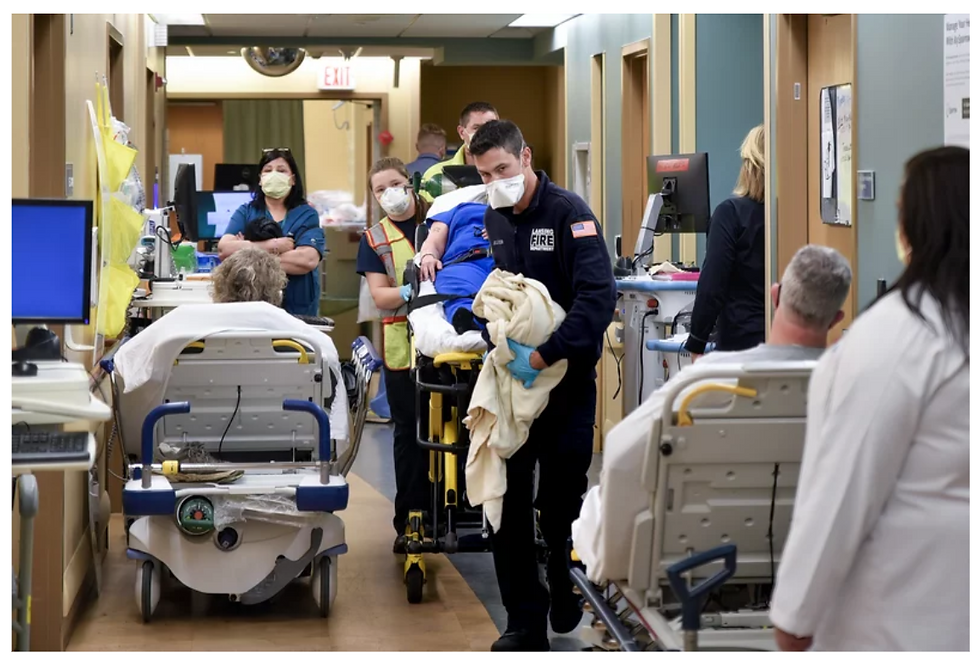Why Wound Specialists are Essential Under the New Hospice HOPE Initiative
- katherinepiette
- Sep 24, 2025
- 4 min read
Katherine Piette

Beginning October 1, 2025, all hospices will be required to use the Hospice Outcomes & Patient Evaluation (HOPE) tool, replacing the long-standing Hospice Item Set (HIS). Unlike its predecessor, HOPE requires real-time, standardized patient assessments at admission, during mandated update visits, and at discharge. One of the most impactful changes is the introduction of Section M: Skin Conditions, which spotlights wound care as a core element of hospice quality reporting.
For hospice providers, this shift presents both opportunities and challenges. It elevates wound care documentation from optional narrative notes to a structured, auditable dataset, making accurate wound identification, classification, and management non-negotiable. At the same time, it exposes the shortage of clinicians with the specialized skills required to meet these standards.
Wounds in Hospice: More Than a Documentation Requirement
Wounds are common in hospice, with nearly one-third of patients experiencing skin breakdown or ulcers during their care. These conditions profoundly affect quality of life, causing pain, odor, drainage, and infection that can limit mobility, socialization, and dignity in the final stages of life.
The Hospice HOPE tool requires hospices to document:
Presence and type of wounds (pressure injuries, diabetic foot ulcers, MASD, Kennedy terminal ulcers, surgical wounds, etc.) - 30% of wound etiologies are misidentified; 50% of pressure injuries are misstaged (Corstrata data)
Treatments applied (turning/repositioning, pressure-relieving devices, dressings, incontinence management, etc.) - 70% of treatment plans are not evidenced based (Corstrata data)
This level of detail ensures wounds are not overlooked, but it also means that generalist hospice staff must now perform wound assessments with the accuracy of a wound-certified specialist.
The Hospice HOPE Compliance and Financial Imperative
Accurate wound documentation under HOPE isn’t just about patient comfort; it’s tied to compliance and payment:
HQRP Penalties: Hospices must successfully submit at least 90% of HOPE assessments within 30 days. Falling short results in a 4% reduction in Medicare reimbursement, a devastating penalty in today’s tight financial environment.
Future Reimbursement: CMS has signaled that HOPE data will inform future payment reform, potentially tying hospice reimbursement to patient acuity (such as wound burden) and quality outcomes.
For hospices, missing or inaccurate wound data can result in both regulatory risk and lost revenue.
Why Wound Specialists Are Critical Under HOPE
1. Accurate Classification and Documentation
The new HOPE wound categories require clinicians to distinguish between complex conditions, such as MASD vs. pressure injuries or malignant fungating wounds vs. chronic venous stasis ulcers. Misclassification not only undermines care quality but can also jeopardize compliance. Board-certified wound, ostomy, and continence nurses (WOCNs) bring the expertise to ensure wounds are correctly staged, categorized, and documented.
2. Enhanced Symptom Control
HOPE directly ties wound care to symptom management quality measures, requiring follow-up within two days for any reported moderate to severe pain or distress. Wound specialists are uniquely equipped to guide effective interventions, optimizing dressings, managing exudate and odor, and advising on pain control strategies.
3. Risk Mitigation for Hospices
Survey deficiencies, family complaints, and litigation often stem from inadequate wound management. With HOPE creating a transparent record of symptom burden and skin integrity, gaps in care will be more visible than ever. Partnering with wound experts reduces these risks and ensures survey readiness.
4. Staff Support and Education
Many hospices do not employ full-time wound specialists. Virtual wound care providers can train staff, provide real-time consults, and reinforce best practices, helping generalist nurses feel confident in meeting HOPE’s rigorous requirements.
Virtual Wound Care: A Scalable Solution
Not every hospice can staff a WOCN, especially in rural or resource-limited settings. CMS allows hospices to contract for highly specialized nursing services, including wound care, when internal staffing is impractical. Virtual wound and ostomy consults extend specialist expertise into any care setting, ensuring every hospice patient receives expert evaluation and compliant documentation.
Final Word: Turning Compliance into Compassionate Care
The HOPE initiative raises the bar for hospice quality by making wounds impossible to ignore. But, this isn’t just a regulatory burden; it’s a chance to improve patient dignity, comfort, and outcomes at the end of life.
By ensuring access to wound specialists, whether in-house or virtually, hospices can meet HOPE requirements, safeguard reimbursement, and most importantly, deliver the compassionate, high-quality care that every patient deserves.
Call to Action
The HOPE initiative is here—and with it comes higher expectations for wound care accuracy, compliance, and quality. Every hospice must now demonstrate wound expertise at the same level as core symptom management.
Don’t leave your team struggling to meet these new requirements on their own. Corstrata’s board-certified wound specialists provide virtual consults, staff training, and real-time documentation support so your hospice can:
Protect your Medicare reimbursement by avoiding HOPE-related penalties.
Elevate patient care and dignity with expert wound management.
Give your staff confidence by providing access to specialists whenever they need it.
Is your hospice ready for HOPE? Partner with Corstrata today and ensure your patients—and your organization—receive the expert wound care support this new era demands.
About Corstrata
Corstrata is a virtual care solution that utilizes technology to provide access to scarce certified wound, ostomy, and continence nurses (WOCNs) at the patient's bedside in multiple provider settings, including home health, hospice, skilled nursing facilities, and hospitals across all 50 states. Corstrata's team of WOC nurses provides consultations with provider staff at the patient's bedside, either through HIPAA-compliant video or through review of store-and-forward wound images, to improve clinical and financial outcomes for providers.




Comments